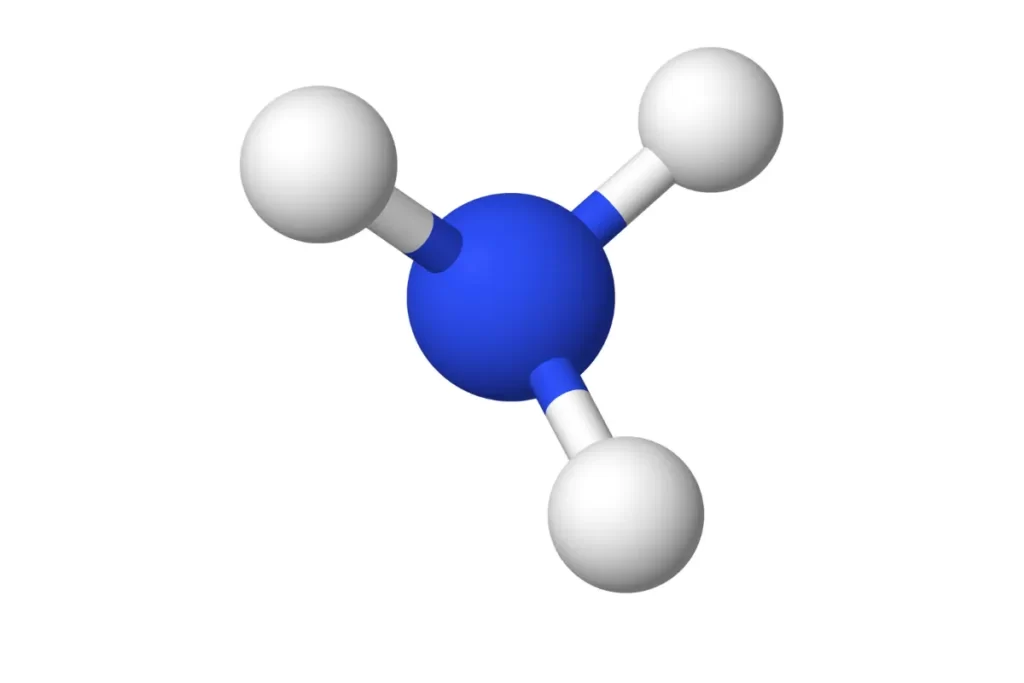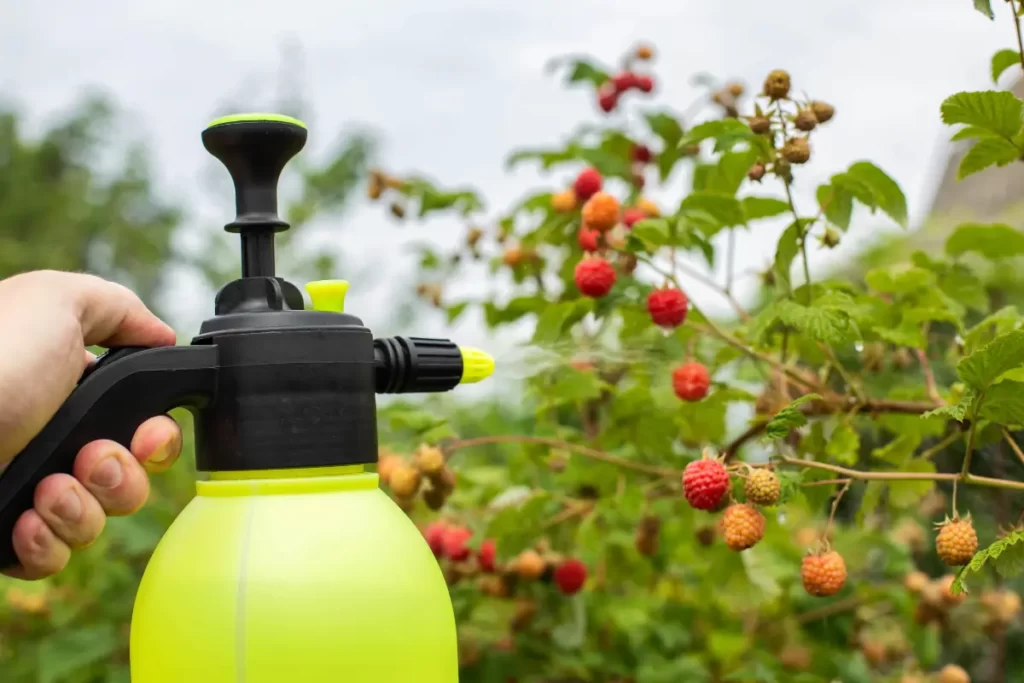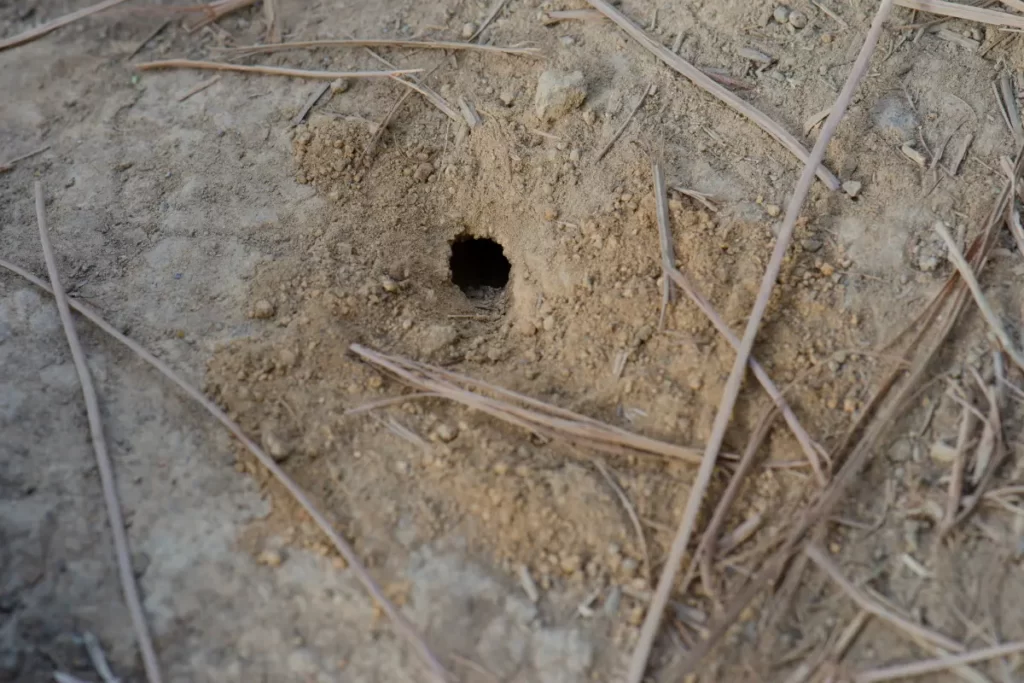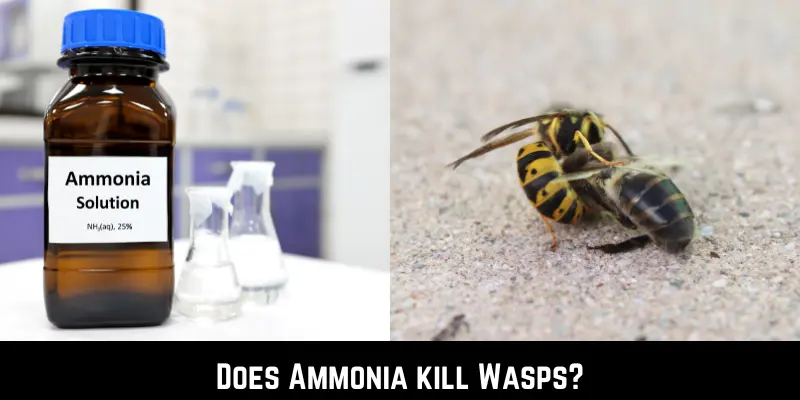When you’re having fun in the garden or at picnics, wasps can be unwanted visitors. Their bites don’t just hurt; they can cause allergies for some people. A common question that comes up is, “Does ammonia kill wasps?
Ammonia is not typically used as a primary method to kill wasps. While the strong scent of ammonia might deter some pests, it’s not a guaranteed method for exterminating or repelling wasps.
Some people believe it’s great, while others need to be sure. Want to know the real deal? Read on as we share the facts and give tips that help keep your outdoor parties wasp-free.
Ammonia
Chemical Properties

Ammonia, or NH₃, is a smelly gas important in nature and many industries. It’s a clear gas lighter than air and can dissolve easily in water. When it does, it turns into ammonium hydroxide, a mild cleaning agent.
What’s special about ammonia is its nitrogen atom, which has an extra pair of tiny particles called electrons. This allows ammonia to give electrons to other chemicals, forming different combinations. It can also connect to metals, creating various mixes with them.
Another cool thing about ammonia is that it can give and take tiny particles called protons. This means it can act a bit like an acid or a base. For example, as a base, it can take on protons and change into ammonium ions.
But it can also give away a proton, acting like an acid, though this doesn’t happen as often. All these unique traits make ammonia a versatile chemical, useful in many reactions.
Common Uses

- Farming: One of the biggest uses of ammonia is in making fertilizers. Products like ammonium nitrate and urea help crops grow better, changing how farming is done.
- Cleaning: At home, ammonia is a popular cleaner. You’ll find it in window cleaners and other cleaning products because it removes grease and leaves things shiny.
- Cooling Systems: A long time ago, ammonia was a key ingredient in big refrigerators. Even though other materials took place for a while, ammonia is returning because it’s better for the environment.
- Medicines: Ammonia is important in making medicines. It’s an ingredient in many drugs and other health products.
- Food: Ammonia also helps make some food items. For example, ammonium bicarbonate is used in baked goods. Plus, it helps keep food places clean.
- Clothes & Leather: In making clothes, ammonia helps set certain materials. And for leather, it’s used in processes like cleaning and tanning.
In many ways, ammonia is everywhere – from the plants we eat to the cleaning sprays we use. It’s a quiet helper, making things better and easier for us. So, remember how important ammonia is in our world, whether you’re enjoying a green park or looking through a clean window.
How Can Ammonia Kill Wasps?
Mechanism of Action
What’s Ammonia? Ammonia is made of hydrogen and nitrogen. It has a strong, sharp smell warns many animals, including wasps, to stay away.
- Breathing Problems for Wasps: Wasps breathe through tiny holes called spiracles. The potent smell of Ammonia can irritate or block these holes. This can make breathing hard for wasps and may even suffocate them.
- Harming Their Bodies: Ammonia isn’t just smelly. It’s also harsh. If wasps touch Ammonia, especially if it’s very strong, it can hurt their outer shell and inside parts.
- Messing with Their Signals: Ammonia might also affect how wasps send signals in their bodies. This can confuse them, make it hard for them to talk to each other, and even stop them from moving properly.
- A Warning, Not Always a Weapon: Even though Ammonia can hurt wasps, its main job might be to scare them away. The smell of Ammonia tells wasps that a place isn’t safe, so they might think twice before staying or searching for food there.
Efficacy
- Strength Matters: Ammonia can work better on wasps if it’s stronger. However, using very strong ammonia can be dangerous. It can hurt plants, pets, and people and is not good for the environment.
- Using It Right: To make ammonia work, you often put it directly on the wasps or their home. But be careful! If you bother a wasp at home, they might get mad and sting.
- It Doesn’t Last Forever: Ammonia might chase away or kill some wasps, but it’s usually just for a short time. The wasps might come back after the strong smell goes away, especially if they like that spot.
- Think of Nature: If you use too much ammonia outside, it might harm other good bugs, plants, and even water. It’s important to use it carefully.
- Be Safe: If you’re considering using ammonia, remember to wear the right safety stuff. Safety glasses, gloves, and maybe even a mask can help. This keeps you safe from wasps and from the strong ammonia.
- Other Options: Since ammonia has some downsides, you might want to consider other ways to deal with wasps. There are natural ways to keep them away, experts who can help, or even certain plants that wasps don’t like.
Ammonia can help with wasps, but it’s complicated. If you want to use it, be careful and know what you’re doing. When dealing with wasps, it’s not just about getting rid of them. It’s also about living with them in a good way for nature.
Does Ammonia Kill Wasps in The Ground?

Ground wasp nests are complex. They have many rooms and paths that twist and turn. If you pour ammonia into this tricky setup, it might only reach some places. Ammonia has a powerful smell that can push wasps away, but it might not kill them all.
Because the ammonia we use at home is not very strong and wasp nests are big and complicated, using it to try and kill all the wasps might not work as we hope.But here’s a thought. The pungent smell of ammonia may make the wasps want to move elsewhere.
So, ammonia might cause the wasps think about moving to a different place instead of killing them. However, this idea needs to be fixed. Even if the wasps move, they might go to a place close by, which doesn’t really solve the problem.
Also, there’s something else we need to think about. Pouring ammonia in the ground can change the soil, which might hurt plants. And if we’re not careful, it could even mix with the water we drink
How to Use Ammonia for Wasp Control?
People often use ammonia at home for cleaning and to keep pests away. If you’re thinking of using it to deal with wasps in your garden or ground nests, it’s important to know how to do it safely. Using ammonia without being careful can cause problems.
Precautions

- Stay Safe: Ammonia is strong and can hurt you. Always wear gloves and safety glasses. Because it smells very strong, wearing a mask is a good idea to avoid breathing it in too much.
- Think of the Environment: Pouring ammonia outside can change the soil, which may harm plants. Also, if not used correctly, it could mix with our drinking water. So, be careful and think about our earth when using it.
- Be Ready for Angry Wasps: If you bother a wasp nest, the wasps might get upset. Even if you use ammonia, be careful. It might be a good idea to wear thick clothes or call an expert, especially if the nest is big or hard to get to.
- Keep Pets and Bugs Safe: Keep your pets away when using ammonia. They might not know it’s dangerous. Also, remember that there are good bugs in the garden. Try not to hurt them when dealing with wasps.
- Storing and Throwing Away: Always keep ammonia where kids can’t get it. Store it in a cool place with good air. After you’re done, don’t mix it with other things. Throw it away the right way, as your town or city says.”
Remember, it’s always good to know how to use things safely.
Step-by-Step Guide
- Watch the Nest: Look at the Nest from far away at different times. This helps you see when wasps come and go. The best time to act is early morning or late evening when they’re calm.
- Dress Safe: Wear long clothes that cover your whole body. Also, put on gloves, safety glasses, and a mask. This keeps you safe if the wasps get upset.
- Make the Ammonia Mix: Mix the same amount of ammonia and water in a big bucket. If you have many wasps, make it stronger. But remember, strong mixes can hurt the environment.
- Go Slowly and Quietly: Walk slowly to the Nest. If it’s dark, use a flashlight. It’s best to use a red or yellow light because wasps don’t see these colors well.
- Pour the Mix and Step Back: Pour the ammonia water into the nest hole. Stay away from the spot so wasps can’t get you. After pouring, move away quickly but quietly.
- Check the Nest Later: Look at the Nest for the next two days. If you see fewer wasps, it worked! But they might have moved if they are still there, or your mix didn’t get everywhere.
- Try Again or Try Something New: If you still see wasps, you can use the ammonia again. Or, try something natural, like peppermint oil. If it’s too hard, call an expert.
- Close the Nest Hole: When you’re sure the wasps are gone, cover the nest hole with dirt so new wasps can’t move in.
- Clean Up: Clean all the things you use. If you spill ammonia on plants, pour lots of water to help them be okay.
Remember, we live with wasps and need to be careful. Using ammonia is one way to deal with them, but we must also think about nature. It’s our job to keep things balanced and safe for everyone.”
How Fast Does Ammonia Kill Wasps?
How long it takes for ammonia to kill a wasp isn’t simple. Unlike some bug killers, ammonia doesn’t kill wasps quickly. If a wasp touches the ammonia, its outer body can get hurt, and it might die later.
This can take anywhere from a few minutes to many hours. It depends on how strong the ammonia is, how big and healthy the wasp is, and what the weather is like.
When you put ammonia near a wasp nest in the ground, the wasps get very confused. The pungent smell of ammonia makes their home feel uncomfortable. But just because they’re confused doesn’t mean they die right away.
But the main power of ammonia isn’t in killing wasps fast. It’s more about making them feel like they should move somewhere else.
Alternatives to Ammonia to Kill Wasp?

| Type | Description |
| Chemical Alternatives | |
| 1. Pyrethroids | Pyrethroids are synthetic chemical compounds derived from natural pyrethrins found in chrysanthemum flowers. Many over-the-counter wasp sprays contain these chemicals due to their efficiency in targeting the nervous system of the pests. While effective, they should be used cautiously, avoiding direct skin contact or inhalation. Brands like Raid or Spectracide often utilize these compounds in their formulas. |
| 2. Soapy Water | A mixture of liquid dish soap and water can efficiently kill wasps. When sprayed on them, the soap breaks down their exoskeleton, making it hard for them to move and eventually killing them. This method is less toxic than many commercial sprays and can be easily made at home. Ensure you use a concentrated solution for better effectiveness. |
| 3. Boric Acid | Boric acid acts as a stomach poison for wasps. Mixing this with some sugar and water to create an attractive bait can be a lethal trap for these pests. However, this chemical can be harmful to pets and humans if ingested or if there’s prolonged exposure. Always use gloves and place traps away from areas frequently accessed by children or pets. |
| 4. Diatomaceous Earth | This is a natural insect killer made from the fossilized remains of tiny aquatic organisms. When wasps come in contact with diatomaceous earth, they absorb the oils from their exoskeletons, leading to their death. Sprinkle this powder around nests or where wasps frequently. Always opt for food-grade diatomaceous earth and be cautious of inhalation. |
| Natural Alternatives | |
| 1. Peppermint Oil | Many pests, including wasps, despise the scent of peppermint. Mixing a few drops of peppermint oil with water and spraying it around the nest or areas where wasps gather can be a deterrent. For a stronger effect, increase the concentration of the oil. Remember, while it repels wasps, it might not kill them. |
| 2. Lemon and Clove | The unique combination of lemon and clove is a potent repellent for wasps. Cut a lemon in half and push 10-15 cloves into each half. Place these strategically around outdoor areas to deter wasps. The scent of cloves mingled with lemon is unappealing to these pests. Again, this method primarily repels rather than kills. |
| 3. Vinegar Trap | Create a simple wasp trap using apple cider vinegar. Pour vinegar into a bowl and mix it with some sugar to attract the wasps. Then, add a few drops of dish soap to break the surface tension. Wasps are drawn to the scent, but they cannot escape once they land and eventually drown. |
| 4. Cucumber Slices | Cucumber contains an acidic property that wasps dislike. Slicing a cucumber and placing the slices around your picnic or outdoor gathering can keep wasps at bay. It’s a non-toxic way to create a wasp-free zone without harming them. |
Pros and Cons of Using Ammonia
When dealing with pests like wasps, we must consider being safe, smart, and caring for the environment. A lot of people talk about using ammonia to handle wasps. There are good and bad sides to this.
Pros of Using Ammonia on Wasps:
- Easy to Find and Cheap: Most of us have ammonia at home, maybe in the kitchen or garage. So, we don’t have to buy something special or spend a lot.
- Keeps Wasps Away: Even if it doesn’t always kill wasps, the strong smell of ammonia can make them want to leave their nest.
- Simple and Clean: Unlike some bug sprays with many chemicals, ammonia is pretty simple. When it breaks down, it doesn’t leave a lot of harmful stuff behind.
- Works on Other Pests Too: We’re talking about wasps now, but ammonia can help with other pests in the home, too.
Cons of Using Ammonia on Wasps:
- Can Hurt the Environment: Pouring ammonia on the ground can change the soil, which might hurt plants. If we’re not careful, it could also harm our water.
- Might Not Kill All Wasps: Sometimes, ammonia doesn’t get rid of all the wasps. Some might stay or move close by.
- Safety Issues: Ammonia can be dangerous for us, too. Breathing it in or getting it on our skin can hurt, and wasps might get angry and sting if we try to pour it on their home.
- Can Harm Helpful Bugs: Using ammonia might bother or hurt other good insects and animals in our gardens.
The relationship between people, wasps, and ammonia is complicated. While ammonia has some good points, it’s not a perfect solution. When using it, we should think about our safety and the health of our gardens and planet.
Conclusion
People and wasps have always been part of nature’s big story, and ammonia plays a special role. It can both bother and possibly get rid of wasps, which sounds useful.
Ammonia is easy to find and can keep wasps away, but we need to consider how it affects our environment and whether it always works. In the world of home solutions, using ammonia for wasps reminds us of something important: we should act with care, knowledge, and balance to make sure we’re doing right by nature.
FAQs
References
Ahmad, S., Khan, I., Husain, A., Khan, A. and Asiri, A.M., 2020. Electrical conductivity based ammonia sensing properties of polypyrrole/MoS2 nanocomposite. Polymers, 12(12), p.3047.

